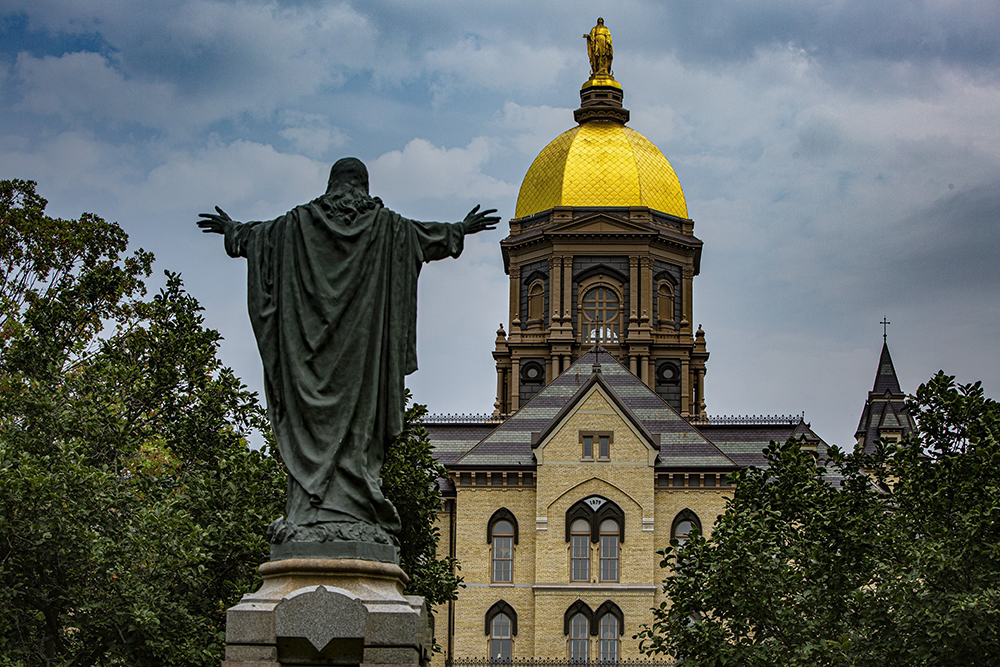
PROSPECT HEIGHTS — Four months after Pope Francis spoke of the responsibility political leaders have to ensure that artificial intelligence is used ethically, the University of Notre Dame has announced it will develop faith-based frameworks for ethical uses of the technology.
Notre Dame, one of the preeminent Catholic universities in the United States, announced on Oct. 10 that it had been awarded a $539,000 grant from Lilly Endowment Inc. to develop the frameworks.
The frameworks, which will begin with a one-year planning project, will be developed by the Notre Dame Institute for Ethics and the Common Good. The institute’s director, Meghan Sullivan, called the announcement “a pivotal moment for technology ethics.”
“[Artificial General Intelligence] is developing quickly and has the potential to change our economies, our systems of education, and the fabric of our social lives,” Sullivan said.
“We believe that the wisdom of faith traditions can make a significant contribution to the development of ethical frameworks for AGI,” added Sullivan, who is also the Wilsey Family College Professor of Philosophy at the university.
According to an announcement from the South Bend, Indiana university, the one-year planning project to begin the process of developing the frameworks will engage and build a network of leaders in higher education and technology, as well as those of different faiths, to broach the topic of ethical uses of AI, and eventually create the faith-based ethical frameworks.
“This project will encourage broader dialogue about the role that concepts such as dignity, embodiment, love, transcendence, and being created in the image of God should play in how we understand and use this technology,” Sullivan said. “These concepts — as the bedrock of many faith-based traditions — are vital for how we advance the common good in the era of AGI.”
The project will culminate in September with a conference focusing on the most pressing faith-based issues relating to the proliferation of AGI and providing training and networking opportunities for leaders who attend, according to the university.
According to 2024 statistics from National University — a private university in San Diego, California — 77% of companies are either using or exploring the use of AI in their businesses, and 83% of companies claim that the technology is a top priority in their future plans.
Pope Francis made his comments about artificial intelligence this past June in an address to leaders gathered for a summit in southern Italy. In his remarks, the pontiff emphasized that AI must only be used to benefit humanity and called on political leaders to mitigate its risks.
“We cannot allow a tool as powerful and indispensable as artificial intelligence to reinforce such a (technocratic) paradigm, but rather, we must make artificial intelligence a bulwark against its expansion,” Pope Francis said. “This is precisely where political action is urgently needed.”
Lilly Endowment Inc. is a private foundation created in 1937 by J.K. Lilly Sr. and his sons Eli and J.K. Jr. through gifts of stock in their pharmaceutical business, Eli Lilly and Company. The endowment, which is separate from the company itself, supports the causes of community development, education, and religion and is especially committed to its hometown of Indianapolis, Indiana.
David Go, vice president and associate provost of academic strategy at Notre Dame, thanked the Lilly Endowment for its support, “which will enable us to convene a diverse group of technology experts, scholars, and religious leaders for important conversations about artificial general intelligence and all the ways it could impact our society.”
“As a leading global Catholic research university, Notre Dame has a special obligation to address the most significant ethical questions of the day through scholarship, education, and public engagement,” Go said, “and this conference will enable our university-wide ethics initiative to engage others in doing just that.”
